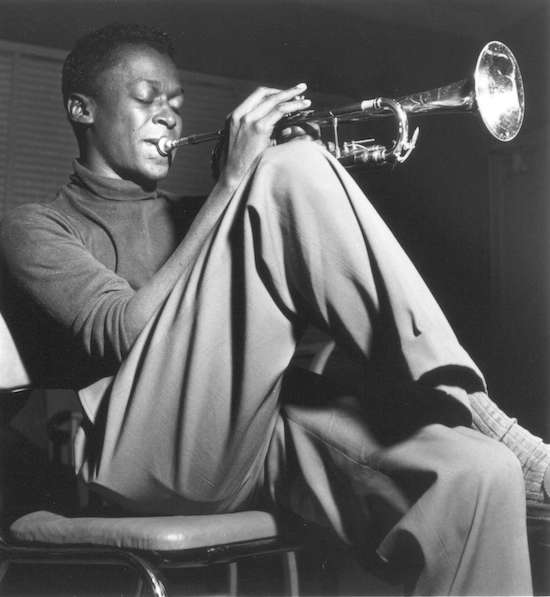Nick Cave [The Bad Seeds, Grinderman, Birthday Party]
My favourite Miles Davis album is On The Corner.
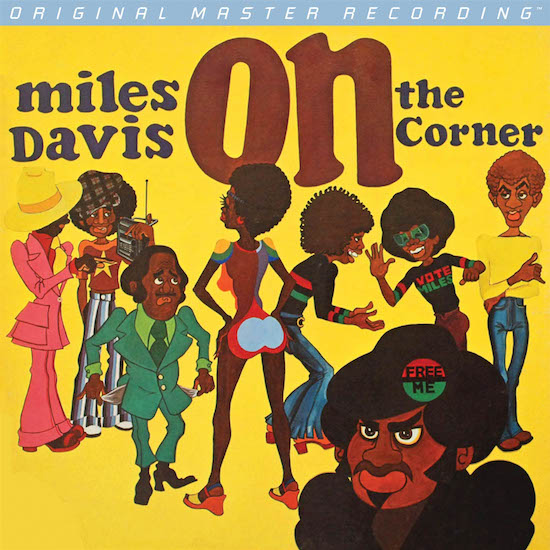
NC: I love all of those live albums around Get Up With It [Dark Magus, Aghartha, Pangaea] but I think it’s On The Corner is one that I really like. It really stands out because the band use solos in the same way as a lot of that jazz stuff… with egalitarianism between the instruments that creates this incredibly unique wall of sound that I just love so much. It doesn’t draw you in to any particular instrument like most music does; and I really enjoy listening to music in that way. And the playing on it is amazing. On The Corner… I remember first hearing it and it wasn’t that long ago. Maybe 15-years-ago and it had that [starts stamping on floor and clapping hands to rhythm] hand clap rhythm to it and I remember being as completely knocked out by it as I was when I heard John Lee Hooker for the first time.
John Lydon [Sex Pistols, PiL]
My favourite Miles Davis album is Bitches Brew.
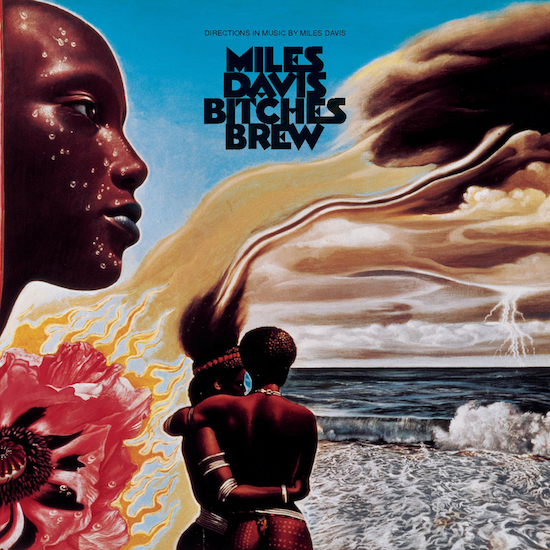
It was very strange what PiL could achieve in terms that others couldn’t. For instance there was the year when we played a cinema downtown in Harlem. A small place and James Blood Ulmer turned up and there we were just making stuff up as we went along and afterwards he came backstage and said: [drawls] ‘That was the most amazing thing I’ve ever heard. You made me think about my music.’ I thought he was joking but apparently not. The Isley Brothers said this to us. And one of the Four Tops.[laughs]
And the most fun ever was… Oh god, come on, what’s your name? Miles! Miles Davis! He came in the studio when I was doing Album and those were songs that I deliberately put into a very rigid structure because I was into the absolute framework of pop sensibility… pop orchestrated deliberately and tightly. And I was howling away and this trumpet started blowing and it was him standing behind me. And it was beautiful but it absolutely murdered the vocal. And problem was he was playing exactly what I would have been singing. It was the same melody line so we couldn’t use it. So it was interesting but… sorry, there you go, my record goes first. Not ‘Oh, he’s a great jazz musician.’
So he got the chop from Album. But you know… I was very, very thrilled that he liked what he was listening to because I’m a fan of Miles Davis.
Bitches Brew is my favourite. The drums on that are stunning and they fit in with the drumming by Jaki on Can’s Tago Mago. That was the best line-up he played with. The other stuff is too easily copied by the Japanese and made note perfect. [laughs] But that album just has the feel to it. I’ve been to several Miles gigs and I like the idea too and I used to do this. I’d watch him do it. Turning his back to the audience. Sometimes you need to do that in order to get in to the right mood. To turn away from the audience who are waving at you or blowing you kisses. Or telling you to fuck off and it can kind of interrupt where it is you want to be musically at that point.
Ennio Morricone [composer]
I love Miles Davis. I couldn’t decide on one favourite album of his but he is what I would call a genius.
Keith Leblanc [Sugar Hill House Band, Tackhead, The Maffia]
My favourite Miles Davis album is Jack Johnson.
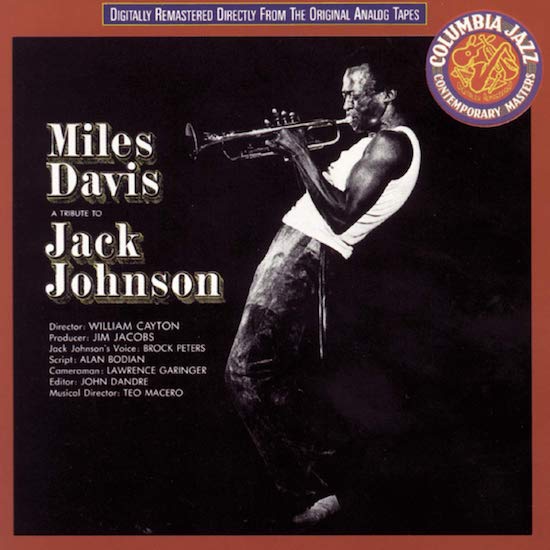
I love the album, I just love the space on it. It’s got McLaughlin playing his butt off on there, Billy Cobham playing drums, Miles playing organ and trumpet. And I think what I really like about that album is what Miles didn’t play on it. There’s space in it. I just love the album, it’s my all-time favourite album of Miles Davis. It’s just the funkiest, bluesiest thing he ever did! He’s one of my all time favourite musicians. If you haven’t heard it you should go out and get it. It’s like one long song, the whole album. If you buy it and listen to it, I’m sure you’ll hear bits of it you’ll go ‘Oh! I heard this bit on this program and they used that on the news!’
People took all kinds of little bits of that album and used it in different places. Very interesting, I think you’d like it!
Iggy Pop [The Stooges]
25 years ago more or less I found Sketches Of Spain and Jack Johnson on vinyl in a no frills used record shop in NYC. I paid less than $5 for the two. They have been my inspiring companions ever since. The one tears me apart and the other puts me back together.
Jim Sclavunos [Grinderman, The Bad Seeds, Teenage Jesus and the Jerks]
My favourite Miles Davis album is Dark Magus.
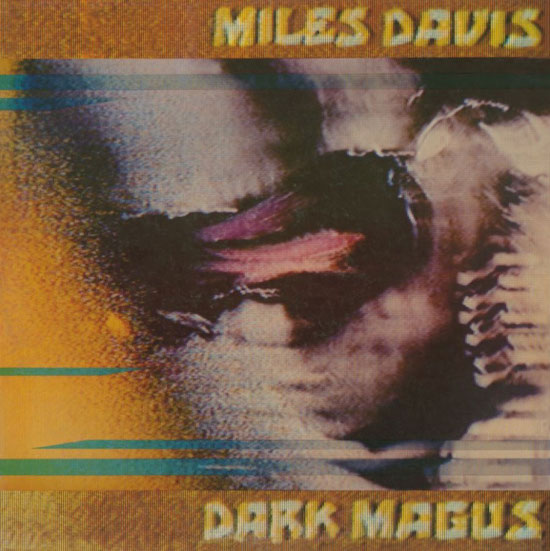
Dark Magus (not to be confused with Gregory Davis’ psychotherapy tell-all book about his famous dad) was the first of three-in-a-row live concert albums (along with Agharta and Pangaea) that culminated Miles’ electric period, all recorded just prior to his disappearance from the music scene for five years. Dark Magus captures a single complete and furious March 3, 1974 performance that he and his group bestowed on an unsuspecting Carnegie Hall crowd.
Rejected at the time by Miles’ label and released solely in Japan, Dark Magus, with scant exceptions, was (and still is) almost universally denounced by the jazz establishment as a disgraceful low point in his career. Even for the other musicians who were part of it, Dark Magus was not the band’s best night out, saxophonist Dave Liebman’s liner notes recalling the performance as a confusing uneven affair.
However, to fresh open ears, unbiased by personal memories or entrenched critical preconceptions, this album is a fantastic listening experience, crackling with unfathomable crazy menace and unrelenting energy. The nine-man (including Miles) line-up includes no less than three guitarists all totally going for it -although one guitar in particular shines: the “wallpaper shredding” (quoth Robert Fripp) sound of Pete Cosey.
Each and every album from Miles’ electric period contains groundbreaking shit and is fully worth investigating. But for me, one of the primary distinctions of Dark Magus is Al Foster’s amazing drumming. He drives the album from start to finish, busting out of the gate hell bent from the get go, just laying into out-and-out unapologetic unrelenting rock grooves almost all the way to the end of the set. Miles’ own contributions come in his signature spurts and surges of snarling dissonant organ clusters, soaring clarion vortexes or terse vicious bursts of minimalist trumpet, whilst he conducts the whole improv maelstrom with shamanistic egoless mastery. For an off-night, all-in-all it’s pretty mind-blowing stuff.
It’s just out of the gateway like a fucking atomic racehorse. And it doesn’t let up.
Paul Weller [The Jam, Style Council]
My favourite Miles Davis album is Milestones.
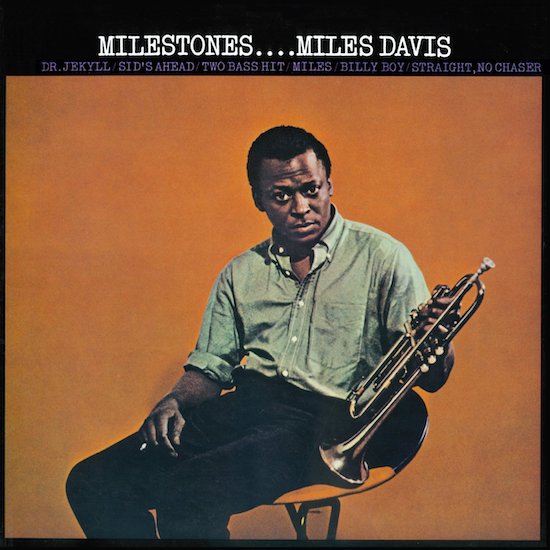
Well, it’s probably Milestones. I love Sketches of Spain but I really love Milestones because it has got a really beautiful sound. I love the arrangements on that and his playing on it is just brilliant. It’s so controlled and it’s not any of that ‘Flight of the Bumblebee’ bollocks that a lot of the jazzers do; it’s very melodic and vocal and very well thought out as well.
Andrew Blick [Gyratory System, One More Grain]
My favourite Miles Davis album is In Concert.
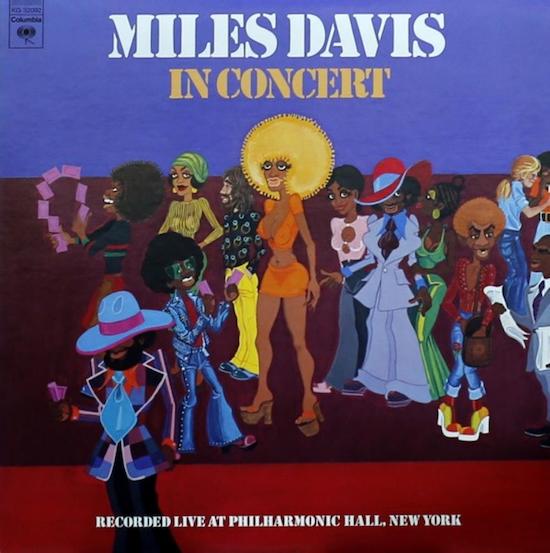
Musicians – even great ones – are lucky to have one good idea in their careers. Miles Davis had about four, and this album is my favourite example of his fourth good idea.
In the first half of the 1970s, partly under the influence of his wife of about a year, the soul artist, Betty Davis, he had hit upon a style that blended African influenced rhythms with avant garde and electronic sound textures. All the recordings stemming from this period seem to be part of a single slab of constantly unfolding music. The connection with ‘jazz’ is tenuous. But the use of group improvisation rather than soloing reminds me of the very early New Orleans jazz approach, to be found on King Oliver’s early studio work from 1923.
The performance was at the New York Philharmonic Hall, on 29 September 1972. There are no track names, simply four sides of vinyl, condensed into two CDs. The brutal opening stabs set the tone for more than 90 minutes of groove based improvisation, with full rhythm section, keyboards and soprano sax alongside Davis. What really makes it stand apart is that unlike the fusion and prog rock of the era, the players are holding back rather than indulging themselves; building on a simple motif rather than hopping between different sections. The closest comparison that is sometimes drawn is with contemporaneous West German bands like Neu! and Can.
Few critics liked this era of Davis at the time, and though this period has been rehabilitated during the four decades in which the rest of the music world caught up with him, some fans of electric Davis still don’t rate In Concert. But while studio albums such as Big Fun and On the Corner are great, this one shows him taking the sound out on stage.
Oh, and fans of the On The Corner artwork will be pleased to know that the same artist, Corky McCoy, was used for In Concert.
Mike Patton [Faith No More, Fantomas, Ipecac Records]
My favourite Miles Davis album is Live Evil.
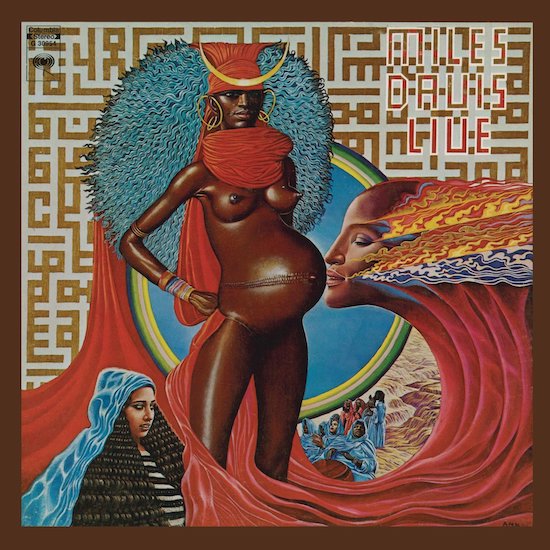
Ah shit… Ah shit… Ah shit! I’ll tell you the one I’ve been listening to the most recently – Live Evil. It’s a concert, a really well recorded concert. There’s just two tracks on it. These guys just burning, jamming without stopping… They’re really at the top of their powers… at the peak of their powers, and you can feel the energy in it. There’s something wicked about it. It’s like, ‘How can this be possible?’ It makes you want to quit playing… everything!
Angus Andrews [Liars]
My favourite Miles Davis album is Kind Of Blue.
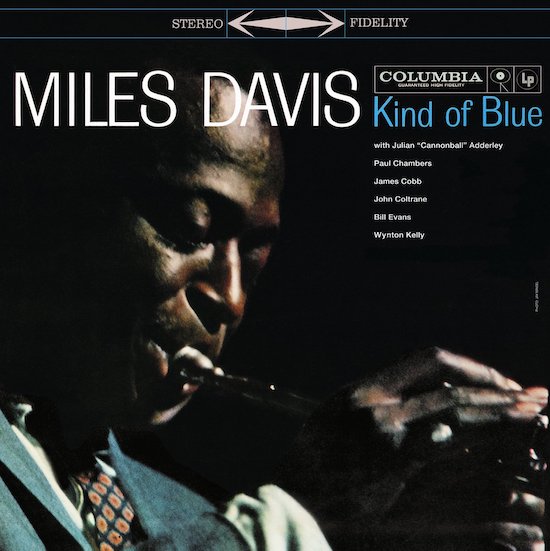
Ah shit man, I’m gonna be the loser that chooses Kind Of Blue! We just did a record club with Beck and this is the record I was pushing for. [They ended up recording Kick by INXS instead.] This was pretty much my introduction to music [in the digital era]. This was pretty much the first thing that came out on CD. Do you remember? It was like Bob Marley Legend, Dire Straits Brothers In Arms and Miles Davis Kind Of Blue. I remember that Miles Davis record… My dad had it on vinyl before that and it was pretty much on non-stop. You can just play this record over and over again. It’s such an amazing thing…
Wayne Coyne [Flaming Lips]
My favourite Miles Davis album is Bitches Brew.

Well it would probably be Bitches Brew. I mean I like the whole series that comes after that. That record has been around for most of my life and I’ve been round people who have record collections and that’s the record that if there is any jazz at all, that’s it. If you like Black Sabbath then there’s a good chance that might be your one jazz record if you’ve got one. So it’s supposed to be cool. I first heard it when I was ten. I was like ‘What’s this shit? I hate this. The songs go on for 20 minutes.’ If you can pick between Led Zeppelin and Miles Davis when you’re ten you’ll pick Led Zep right? Then when I was like 20 I would go ‘Ah no! I don’t get it. It just feels like it’s going to go on forever.’ Then about ten years ago I heard it and thought: ‘Ah . . .’ I hear a lot of people jam. I hear a lot of musicians trying to get into this groove. A lot of people try and get into this hypnotic thing where they don’t know what they’re getting ready to do but the musicians are just not intense enough. With Miles Davis it’s just about the intensity. There’s something about the things going on and there are subtle changes going on but at the same time it’s like ‘This is what you’re doing motherfuckers!’ And they’re all great musicians and they’re all concentrating on this thing but it’s obviously because of Miles. They’re scared shitless that they’re going to play the wrong thing or play it out of context and Miles is going to physically [attack them] and say ‘Motherfucker!’ And I think you can feel that. Miles doesn’t even come into some of these jams for quite a bit. You’re kind of waiting for the ship to get to a certain point in the ocean before getting on board. It’s just repetitive enough that you don’t worry . . . the mood just builds and builds and builds. And that was part of what we… we always talked about trying something like that. You get lucky. We’d do these jams for Embryonic that would go on for 20-minutes and you could grab a couple of bits out here and there. Cut out the other stuff. Even Miles Davis would do that and put stuff together. And it’s not about saying how it is a performance. Because to me it’s neither. We’re just making a sound. We’re not capturing something. We’re finding something. It’s just something that we play. And that comes from tarnation and just not giving a shit.
Jason Pierce [Spiritualized, Spacemen 3]
My favourite Miles Davis album is Live Evil.

My favourite album chops and changes a lot… I like ‘Live-Evil’, I love all those big ’70s records with the big keyboards on and stuff. ‘Circle In The Round’, we used to play a lot as well. We used to do this thing where if you play Miles Davis before the show, you better be fucking good. When people are that good, it can be the death of everything that’s good about music, and it’s such a rare thing that someone with that much talent isn’t, but also, it’s such a rare thing that you could have a voice that’s so recognisable on an instrument. Jack White, Jimi Hendrix… there aren’t that many people that are as recognisable as him on that instrument.
Chris and Cosey [Throbbing Gristle]
Miles who?

